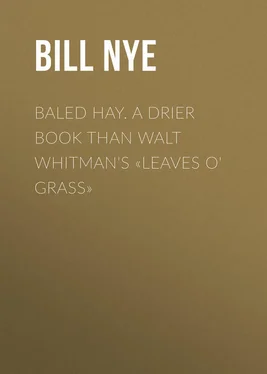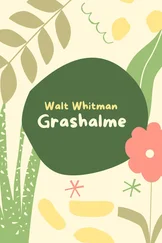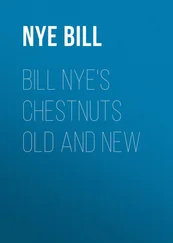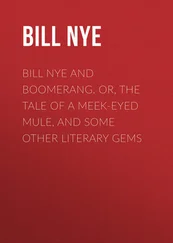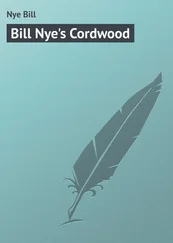Bill Nye - Baled Hay. A Drier Book than Walt Whitman's «Leaves o' Grass»
Здесь есть возможность читать онлайн «Bill Nye - Baled Hay. A Drier Book than Walt Whitman's «Leaves o' Grass»» — ознакомительный отрывок электронной книги совершенно бесплатно, а после прочтения отрывка купить полную версию. В некоторых случаях можно слушать аудио, скачать через торрент в формате fb2 и присутствует краткое содержание. Издательство: Иностранный паблик, Жанр: foreign_prose, foreign_language, на английском языке. Описание произведения, (предисловие) а так же отзывы посетителей доступны на портале библиотеки ЛибКат.
- Название:Baled Hay. A Drier Book than Walt Whitman's «Leaves o' Grass»
- Автор:
- Издательство:Иностранный паблик
- Жанр:
- Год:неизвестен
- ISBN:нет данных
- Рейтинг книги:5 / 5. Голосов: 1
-
Избранное:Добавить в избранное
- Отзывы:
-
Ваша оценка:
- 100
- 1
- 2
- 3
- 4
- 5
Baled Hay. A Drier Book than Walt Whitman's «Leaves o' Grass»: краткое содержание, описание и аннотация
Предлагаем к чтению аннотацию, описание, краткое содержание или предисловие (зависит от того, что написал сам автор книги «Baled Hay. A Drier Book than Walt Whitman's «Leaves o' Grass»»). Если вы не нашли необходимую информацию о книге — напишите в комментариях, мы постараемся отыскать её.
Baled Hay. A Drier Book than Walt Whitman's «Leaves o' Grass» — читать онлайн ознакомительный отрывок
Ниже представлен текст книги, разбитый по страницам. Система сохранения места последней прочитанной страницы, позволяет с удобством читать онлайн бесплатно книгу «Baled Hay. A Drier Book than Walt Whitman's «Leaves o' Grass»», без необходимости каждый раз заново искать на чём Вы остановились. Поставьте закладку, и сможете в любой момент перейти на страницу, на которой закончили чтение.
Интервал:
Закладка:
It was only a dream, but it has made me more thoughtful, and people notice that I am not so giddy as I was.
A NEW and dazzling literary star has risen above the horizon, and is just about to shoot athwart the starry vault of poesy. How wisely are all things ordered, and how promptly does the new star begin to beam, upon the decline of the old.
Hardly had the sweet singer of Michigan commenced to wane and to flicker, when, rising above the western hills, the glad light of the rising star is seen, and adown the canyons and gulches of the Rocky mountains comes the melodious cadences of the poet of the Greeley Eye.
Couched in the rough terms of the west; robed in the untutored language of the Michael Angelo slang of the miner and the cowboy, the poet at first twitters a little on a bough far up the canyon, gradually waking the echoes, until the song is taken up and handed back by every rock and crag along the rugged ramparts of the mighty mountain barrier.
Listen to the opening stanza of "The Dying Cowboy and the Preacher:"
``So, old gospel shark, they tell me I must die;
``That the wheels of life's wagon have rolled into their last rut,
``Well, I will "pass in my checks" without a whimper or a cry,
``And die as I have lived – "a hard nut."=
This is no time-worn simile, no hackneyed illustration or bald-headed decrepit comparison, but a new, fresh illustration that appeals to the western character, and lifts the very soul out of the kinks, as it were.
"Wheels of life's wagon have rolled into their last rut."
Ah! how true to nature and yet how grand. How broad and sweeping. How melodious and yet how real. Hone but the true poet would have thought to compare the close of life to the sudden and unfortunate chuck of the off hind wheel of a lumber wagon into a rut.
In fancy we can see it all. We hear the low, sad kerplunk of the wheel, the loud burst of earnest, logical profanity, and then all is still.
How and then the swish of a mule's tail through the air, or the sigh of the rawhide as it shimmers and hurtles through the silent air, and then a calm falls upon the scene. Anon, the driver bangs the mule that is ostensibly pulling his daylights out, but who is, in fact, humping up like an angle worm, without pulling a pound.
Then the poet comes to the close of the cowboy's career in this style:
```"Do I repent?" No – of nothing present or past;
```So skip, old preach, on gospel pap I won't be fed;
```My breath comes hard; I – am going – but – I – am game to
`````the – last.
```And reckless of the future, as the present, the cowboy was
`````dead.=
If we could write poetry like that, do you think we would plod along the dreary pathway of the journalist? Do you suppose that if we had the heaven-born gift of song to such a degree that we could take hold of the hearts of millions and warble two or three little ditties like that, or write an effigy before breakfast, or construct an ionic, anapestic twitter like the foregoing, that we would carry in our own coal, and trim our own lamps, and wear a shirt two weeks at a time?
No, sir, he would hie us away to Europe or Salt Lake, and let our hair grow long, and we would write some obituary truck that would make people disgusted with life, and they would sigh for death that they might leave their insurance and their obituaries to their survivors.
IT might be well in closing to say a word in defense of myself.
The varied and uniformly erroneous notions expressed recently as to my plans for the future, naturally call for some kind of an expression on this point over my own signature. In the first place, it devolves upon me to regain my health in full if it takes fourteen years. I shall not, therefore, "publish a book,"
"prepare an youmorous lecture,"
"visit Florida,"
"probate the estate of Lydia E. Pinkham, deceased," nor make any other grand break till I have once more the old vigor and elasticity, and gurgling laugh of other days.
In the meantime, let it be remembered that my home is in Laramie City, and that unless the common council pass an ordinance against it, I shall return in July if I can make the trip between snow storms, and evade the peculiarities of a tardy and reluctant spring. Bill Nye.
PINES FOE HIS OLD HOME
TOM FAGAN, of this city, has a wild horse that don't seem to take to the rush and hurry and turmoil of a metropolis. He has been so accustomed to the glad, free air of the plains and mountains that the hampered and false life of a throbbing city, with its myriad industries, makes him nervous and unhappy. He sighs for the boundless prairie and the pure breath of the lifegiving mountain atmosphere. So taciturn is he in fact, and so cursed by homesickness and weariness of an artificial and unnatural horse society here in Laramie, that he refuses to eat anything and is gradually pining away. Sometimes he takes a light lunch out of Mr. Fagan's arm, but for days and days he utterly loathes food. He also loathes those who try to go into the stable and fondle him. He isn't apparently very much on the fondle. He don't yearn for human society, but seems to want to be by himself and think it over.
The wild horse in stories soon learns to love his master and stay by him and carry him through flood or fire, and generally knows more than the Cyclopedia Brittanica; but this horse is not the historical horse that they put into wild Arabian falsehoods. He is just a plain, unassuming wild horse of Wyoming descent, whose pedigree is slightly clouded, and who is sensitive on the question of his ancestry. All he wants is just to be let alone, and most everybody has decided that he is right. They came do that conclusion after they had soaked their persons in arnica and glued themselves together with poultices.
Perhaps, after a while, he will conclude to eat hay and grow up with the country, but now he sighs for his native bunch-grass and the buffalo wallow wherein he has heretofore made his lair. We don't wonder much, though, that a horse who has lived in the country should be a little rattled here when he finds the electric light, and bicycles, and lawn mowers, and Uncle Tom's Cabin troupes, and baled hay at $20 per ton. It makes him as wild and skittish as it does an eighteen-year-old girl the first time she comes into town, and for the first time is met by the blare of trumpets, and the oriental wealth of the circus with its deformed camels and uniformed tramps driving its miles of cages with no animals in them. The great natural world and the giddy maelstrom of seething, perspiring humanity, peculiar to the city world, are two separate and distinct existences.
Конец ознакомительного фрагмента.
Текст предоставлен ООО «ЛитРес».
Прочитайте эту книгу целиком, купив полную легальную версию на ЛитРес.
Безопасно оплатить книгу можно банковской картой Visa, MasterCard, Maestro, со счета мобильного телефона, с платежного терминала, в салоне МТС или Связной, через PayPal, WebMoney, Яндекс.Деньги, QIWI Кошелек, бонусными картами или другим удобным Вам способом.
Интервал:
Закладка:
Похожие книги на «Baled Hay. A Drier Book than Walt Whitman's «Leaves o' Grass»»
Представляем Вашему вниманию похожие книги на «Baled Hay. A Drier Book than Walt Whitman's «Leaves o' Grass»» списком для выбора. Мы отобрали схожую по названию и смыслу литературу в надежде предоставить читателям больше вариантов отыскать новые, интересные, ещё непрочитанные произведения.
Обсуждение, отзывы о книге «Baled Hay. A Drier Book than Walt Whitman's «Leaves o' Grass»» и просто собственные мнения читателей. Оставьте ваши комментарии, напишите, что Вы думаете о произведении, его смысле или главных героях. Укажите что конкретно понравилось, а что нет, и почему Вы так считаете.
